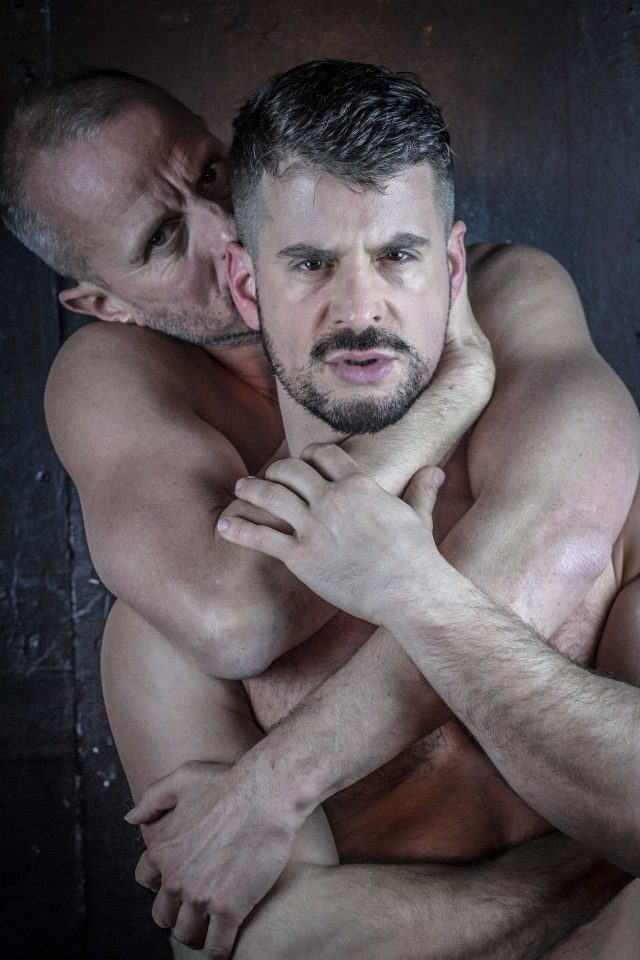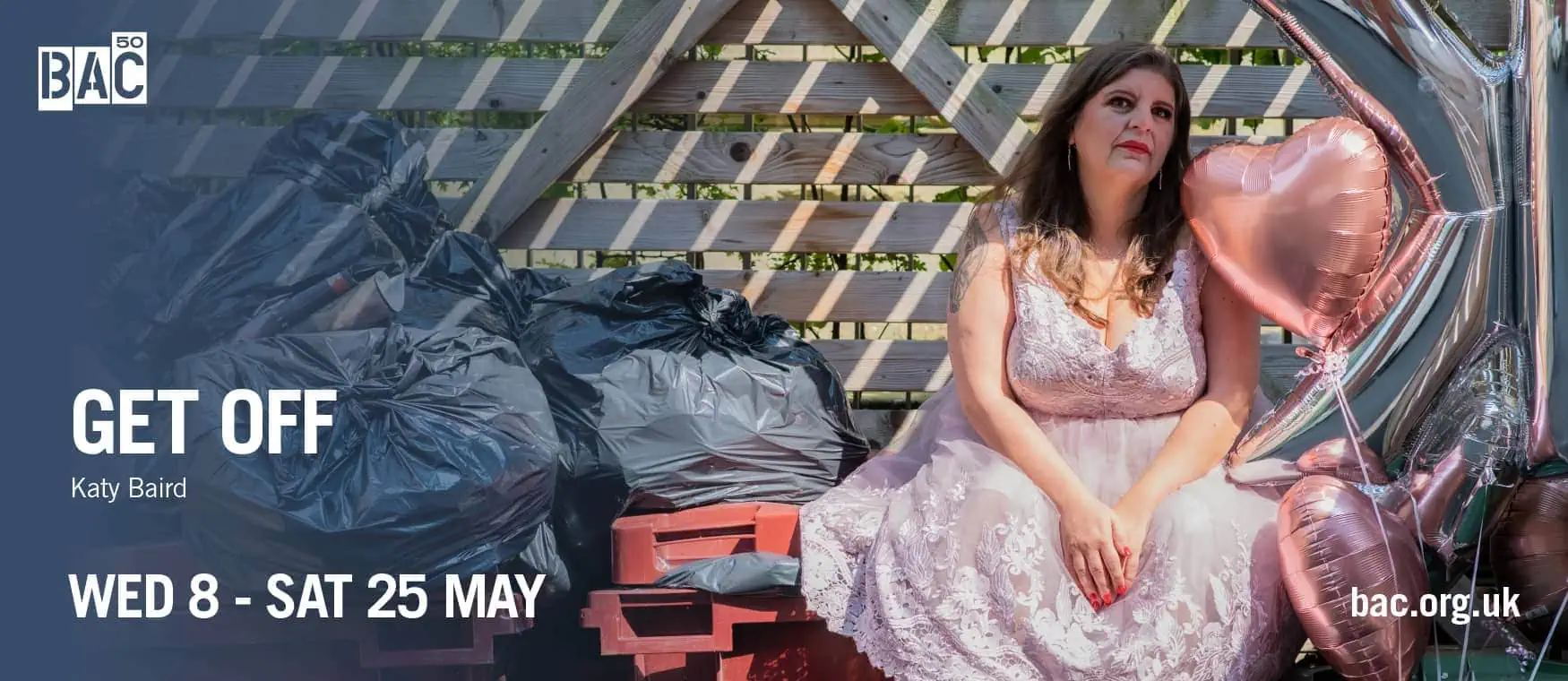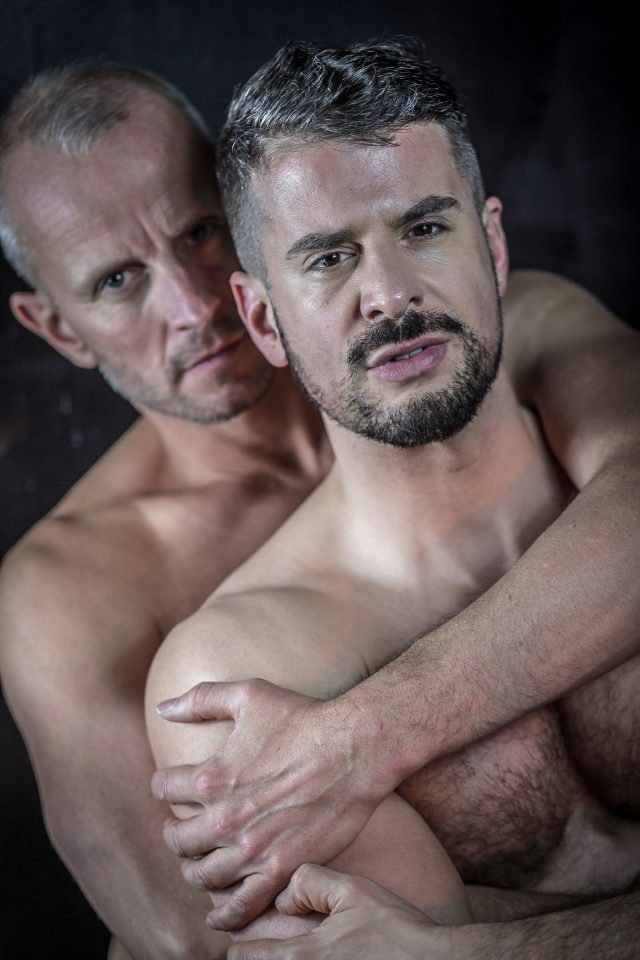We’re in the beer battered bowels of The Glory. It’s their dance basement, which they open up for the purposes of queer club parties, non-binary cabaret, and the general incubation of drag superstars.
Now, it’s playing host to a gay thriller. Gay thrillers are few and far between. When was the last time YOU saw one? By “gay thriller”, we don’t mean Halle Berry in tears in a phone box, or Joan Collins’ pearls clattering down a marble staircase. We mean proper gays, in a proper thriller.
Written by the mellifluous and musclebound Alexis Gregory, and starring him and Jonny Woo, Sex/Crime is an imaginative and striking piece of queer theatre. It’s about death, fetishes and domination, and how the three intertwine.
As a lithe barman in paint-spattered jeans heaves barrels and Peaches burbles tinnily from MacBook speakers, we spoke to Jonny and Alexis about the play, why it’s important, and what it means.
So tell us about the play.
Alexis: It’s a play called Sex/Crime that I wrote, and am starring in with Jonny Woo. Robert Shivara is directing. It’s about two men who meet to recreate the murders of a famous gay serial killer. It’s a queer thriller. I like the idea of reclaiming the thriller as queer. It’s also a comedy – a very dark comedy. It’s a play about fantasy, fear, violence, sex, roles, power, language, and how all those things are tradable commodities. The two characters use all of those things as weapons against one another throughout the whole play. It’s about a society that’s broken down, with no boundaries. It’s about a lack of individual boundaries, or collective conscience.
Why did you want to specifically do a queer thriller? Is it because there’s a lack of queer horror/thriller stuff out there?
Alexis: Yeah, but you could say that about any genre. You don’t have to draw the line at horror and thriller. I’ve got lots of 90s influences in this play actually, and one is the filmmaker Greg Araki. I love the way he queered up a lot of different genres.
One of the themes in the play is different roles. Is that sexual roles, or is it deeper than that?
Alexis: What the audience will discover, is that a lot of it is a grey area. You think it’s one thing to start off with, and then it becomes something else. Both the characters are quite ferocious. We previewed two performances at the end of last year. People responded really well to it, and said they were actually scared. And that they found it really disturbing and really shocking, but also very funny. They then said they felt bad for laughing. So everything shifts and changes, both on stage and within the audience.
That’s great – the best kind of comedy is shocking.
Alexis: Yeah – I write in quite a broad, comic way. It’s full of one-liners and sharp lines. It’s not a subtle comedy – the laughs are quite big.
It’s impressive that you shocked people – that’s quite difficult these days.
Alexis: Yeah, we’re just two actors, with minimal production. I was shocked by how shocking people found it!
What aspect of it elicited that reaction?
Alexis: The drug use. It’s quite normalized within the play. And people found the violence really disturbing. We do it in a very stylized way, so I thought people would be able to disassociate from it. But actually, what we didn’t show was more disturbing.
Jonny: Well, just the description of the violence is shocking. The subject matter is shocking. The fetishisation of serial killers…it’s done in a very glib, flippant kind of way. And we’re both complicit in it.
Alexis: Everything’s normalized for the characters. So there’s a contrast between what the audience consider normal and acceptable, and what they see unfold on stage. There’s a chasm, which I like.
Where did the idea come from?
Alexis: I was playing around with the idea of murders that are viewed as something else. I came up with the idea of someone who was doing that, but considered it art. Almost performance art. And then that idea led to gay serial killers. I thought ‘what can I do that’s about gay serial killers, but not in an obvious way.’ And then I got the idea of people recreating it, which opened up loads of doors. Of course there was the Stephen Port case, and the case with the police officer. And there’s a history of gay serial killers being explored in cinema – like Hitchcock’s Rope and Todd Haynes’s Poison.

It has echoes of JG Ballard’s Crash…
Alexis: Yeah someone else compared it to that, and bought me the book. I hadn’t read it beforehand, but I guess it does have parallels. Throughout the play, fear is fetishised. Fear becomes something that’s considered worthwhile and lucrative. Power is fetishised. Experiences are fetishised. And everything is transferrable. So they’re fetishising one thing at one moment, and something else three seconds later. And when I say “fetishising”, I mean valuing. Not just in a sexual way, but in a broader way. Treasuring it, needing it, enjoying being scared of it. Putting it on a pedestal.
Was there a particular reason that you felt compelled to write this play? What do you want people to take away from it?
Alexis: I want people to think about society, and to think about people who are ostracized, and what lengths that can push them to. I want people to look at the values in society, and how values are slipping. The play is set in a very extreme version of a society where there are no values left. I wanted all of that to come across, but I also wanted it to be a really broad, entertaining comic thriller. Which it is, but with a political and social message underneath.
Jonny: When we spoke about it, that’s what excited me. There are so many gay plays around that are a certain type, a certain ilk. They’re focused on issues about this and issues about that. Then Alexis came to me with the idea of doing a thriller, which was going to be shocking and terrifying and exciting and funny. It’s exciting to do something that’s driven as much by that as it is by the message. It’s really important for The Glory to have something like this happening here.
Sex/Crime is at The Glory from April 9th – April 28th. 7:30pm. Tickets available from outsavvy.com












